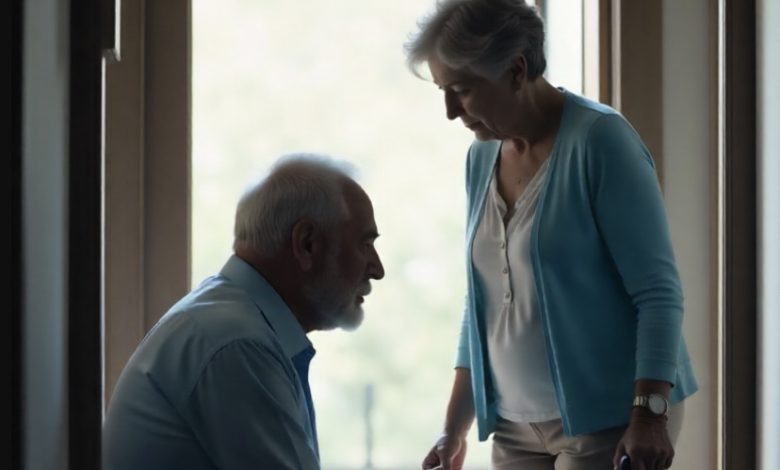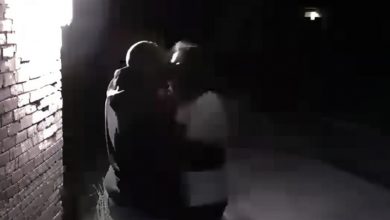Forty years into our marriage, my husband met my gaze and said quietly, “I wish I had never married you.”

The sound of a spoon tapping against a coffee cup was the only noise in the kitchen that morning. Mark sat across from me, his eyes fixed on the steaming mug as if it held all the answers he had been avoiding for decades. I sat quietly, my hands resting on my lap, waiting. After 40 years together, silence had become our most common language — heavy, empty, and unkind.
When he finally lifted his head, his expression was blank. His voice came out flat, like someone stating the weather.
“If I’m being honest,” he said, “I regret marrying you.”
The words didn’t need to be repeated. I heard them loud and clear, and they sank into me like a stone. For a moment, I thought I might break, but I didn’t. I didn’t scream. I didn’t cry. I simply stood, steadying myself on the table, and walked upstairs.
Packing One Bag
Our bedroom looked like a museum of a life I no longer belonged to. The bed was perfectly made. My robe hung neatly behind the door. His cufflinks glistened in a small tray on the dresser. Four decades of marriage were wrapped up in this room — a lifetime of shared space, routines, and raising two children together. And yet, in that moment, it all felt borrowed.
I opened the closet and pulled out a dusty suitcase. With deliberate movements, I started to pack. I folded my clothes carefully, not because I planned to return, but because I still respected the woman I had been when I walked into this house years ago.
On the nightstand, I saw my old leather diary. Inside it were 40 years of silent humiliations, forgotten anniversaries, and nights I had cried into my pillow so he wouldn’t hear. I picked it up, ready to tuck it into my bag, but then I stopped. No — it belonged here. It was part of this house, this life, this history that I was finally leaving behind. I slid it back into the drawer.
Then I zipped my suitcase.
When I walked downstairs, Mark was still sitting at the table. He didn’t ask where I was going. He didn’t try to stop me. For a man who had just declared regret for four decades of marriage, he almost looked relieved.
I picked up my keys, opened the front door, and stepped into the bright morning light. I didn’t slam the door. I didn’t leave a note. I just left.
Looking Back on Our Life
Before those words broke me, I used to believe our marriage, while quiet, was stable. We had met when I was only twenty-two. He was steady, reliable, and safe — the kind of man who always remembered to change the oil and fill my gas tank before a storm. We built a home, raised our children, Grace and Daniel, and lived a life that seemed steady, if not thrilling.
I had once been a teacher, but when the children came, I gave it up. I became the constant. The one who packed lunches, ironed shirts, sewed Halloween costumes, and kept the household running. My life became the invisible glue holding everything together so he could focus on his career.
At first, I took pride in it. Fresh sheets, perfectly matched socks, meals cooked exactly the way he liked them. I memorized his preferences, his moods, his silent cues. I thought that was love.
But the cracks began to show long before his final words.
The First Warning
At our 25th anniversary dinner, I thought it would be special. Grace and Daniel flew home. I set the table with our wedding china, lit candles, cooked his favorite meal. He came home late, tie crooked, no gift in hand. During dinner, a friend raised a glass and toasted to our 25 years together.
Mark stood, gave a small smile, and said:
“Well, I guess we’ve made it. A quarter century. That’s a long time to tolerate anyone. Eventually, it’s just easier to stay than to leave.”
The table laughed awkwardly. There was no “I love you.” No appreciation. Just a casual dismissal of our marriage as endurance. That night, in my diary, I wrote: He doesn’t see me anymore.
Death by a Thousand Cuts
After that, things worsened. He cut me off mid-sentence. He rolled his eyes when I reminded him of doctor’s appointments. He stopped asking about my day.
The final blow came years later at a family brunch. I had baked blueberry muffins from scratch. Grace took a bite, frowned, and said, “Mom, these are so dry.”
Instead of defending me, Mark chuckled. “She’s always had a talent for making things complicated. Remember Daniel’s birthday cake when she forgot the sugar?”
The table roared with laughter. I sat in silence, staring at my plate, my face burning. It wasn’t just a joke — it was a verdict. I had become the family punchline.
That night, after everyone left, Mark patted my shoulder and said, “You did good today. They were happy.”
I smiled faintly, then wrote in my diary: I think I’m done being the joke in my own story.
Walking Away
When I finally left, it wasn’t dramatic. It was quiet, steady, like someone who had already walked away a thousand times in her heart. That Tuesday morning, when he said, “I regret marrying you,” I simply packed my bag and left.
I stayed with my friend Nora at first. She welcomed me into her cozy guest room, but I felt hollow, like I didn’t know how to exist without serving someone else. For days, I wandered like a ghost.
One evening, I opened my old diaries. The faded ink told my story — not of a marriage, but of a woman disappearing inside it. In one entry from 1993, I had written: I think Mark still loves me, but I miss being seen. I want to feel held, not managed.
Reading those words broke something inside me. But they also woke me up.
Remembering Myself
Slowly, I began to reclaim pieces of myself. I took long walks, noticing the way the sunlight hit the leaves. I joined a watercolor class. My first painting was messy, but it felt wonderful to create something for myself. I baked again, not for others, but for the joy of smelling a tart cooling on the counter.
I wasn’t reinventing myself. I was remembering.
When He Noticed
At first, Mark only called about practical things. “The bills are piling up.” “Where’s the insurance paperwork?” “I can’t find the tax forms.” Without me, his carefully ordered life began to unravel. He had never learned where things were, because he never needed to.
I told him calmly, “You’ll figure it out.”
Then came the guilt trips. “So you’re really throwing away forty years over one conversation?”
“This isn’t about one conversation,” I replied. “It’s about a marriage you abandoned long ago. I just finally stopped pretending not to notice.”
Our daughter, Grace, texted me: “Dad says you’re not answering. Are you okay?”
“Yes,” I wrote back. “I just don’t want to keep pretending I’m not hurt.”
It was the first honest thing I’d said in years.
The Call
A month later, my phone rang again. Mark’s voice shook.
“I read your diary,” he said. “The one you left behind. I didn’t know you felt all that. If I had known, maybe things would have been different.”
I let him speak. I listened to his trembling apologies, his pleas for a second chance. He promised to change, to finally see me.
When he was done, I said quietly: “Oh, Mark. You still don’t understand, do you?”
He thought the diary was the end of the story. But it wasn’t. It was only the first step.
The Truth
The truth was, my real plan had been in motion since the moment I walked out that door. The woman he thought he knew was gone. In her place was the woman he had ignored for forty years — the one who had learned to stand tall without permission, to live without waiting for his approval.
When I left, I didn’t just walk away from him. I walked toward myself.
Mark will never meet that woman. Because she’s not waiting at his table anymore. She’s out in the world, living her life, finally free.










